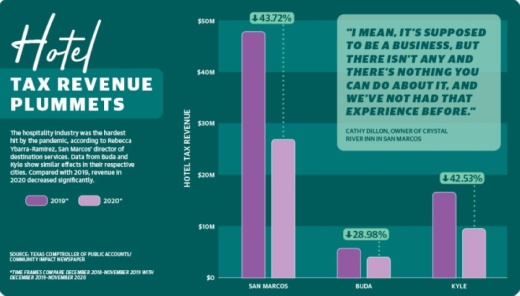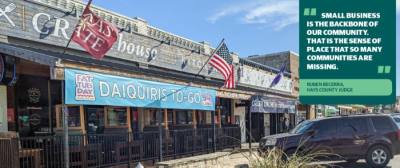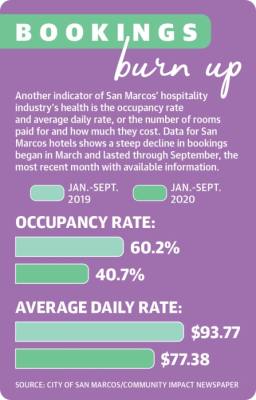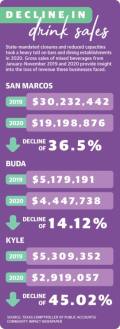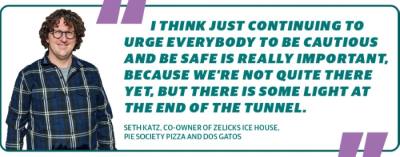Cathy Dillon, owner of San Marcos’ Crystal River Inn, is hopeful that 2021 will be much better for her business than was 2020.
On March 16, 2020, as news about the COVID-19 pandemic began gaining momentum, the phone at Crystal River Inn began ringing off the hook. Over the course of the next few days, Dillon said reservations for the entire year disappeared as weddings, reunions and graduations were canceled because of the coronavirus.
Her and her husband’s bed and breakfast, open for more than 30 years, normally has 50-70% of its rooms booked on any given night, but the string of cancellations brought about by the first wave of the pandemic was the beginning of a 35-day streak without a guest.
“It was just stunning,” Dillon said. “I mean, it's supposed to be a business, but there isn't any and there's nothing you can do about it, and we've not had that experience before.”
The winds may be changing though, as Dillon proudly reported her hotel was fully booked for New Year’s Eve. As distributions of vaccines for COVID-19 ramp up, she said she is cautiously optimistic an economic recovery is on the horizon.
“I think that it's entirely possible that in the next couple to three months we're going to be seeing a lot of, you know, kind of like cabin fever, or the end of cabin fever,” Dillon said.
She hoped vaccinations would translate into a rush of people getting out of their homes to travel or spend money on goods and services, providing a much needed boost to her business. She is not alone.
It is a hope for 2021 shared by other area business owners, community leaders and local officials looking for an economic rebound from the hit Hays County took last year. Specifically, data show the local hospitality industry suffered the most economic damage in 2020.
Throughout the pandemic, not only did local restaurants and bars see plummeting revenues, but hotels, motels and other boarding businesses in the area also saw sharp declines in patronage.
A possible rebound for the hospitality industry
Rebecca Ybarra-Ramirez, San Marcos’ director of destination services, has a conservative appraisal with regard to a recovery for the hospitality industry, both nationally and locally, which she agrees was the hardest hit by the
pandemic.
She said estimations for the industry’s recovery nationwide could require five years, but some cities could recover more swiftly than others.
“We've seen a few more conferences that decided just to cancel, even though they were scheduled for 2021,” Ybarra-Ramirez said. “The calendar itself for Embassy Suites is pretty full starting in March for conferences, but as time goes by we'll see if they actually come to fruition or not.”
In April 2019, hotel occupancy in San Marcos was 61.9%, but dropped to just 21.1% for the same month in 2020, according to information from the city of San Marcos. The occupancy rate averaged 60.2% for January through
September of 2019, but fell to 40.7% for the same time period in 2020.
Similar stories can be heard from numerous dining and hospitality industry workers and business owners.
Seth Katz—a co-owner of Dos Gatos Kolache Bakery, Zelicks Ice House and Pie Society Pizza—counted himself fortunate because most of his team stayed on board after shutdowns, but he noted other businesses were not as lucky.
“Talking amongst industry people, there were some places that literally had zero team members come back,” he said.
According to the Texas Comptroller, mixed-beverages gross receipts in San Marcos from January through November plummeted from more than $30 million in 2019 to less than $20 million in 2020.
Getting business back up to speed was one of 2020’s heftiest challenges, and discovering what workers and customers were comfortable with—and what government regulations would permit—shaped business, Katz said
“It’s been a slow progression, and at a different pace for all of our businesses too,” he said.
To stay afloat long enough for revenues to pick back up, Dillon and Katz took advantage of federal aid in the form of Payroll Protection Program loans, which become grants if certain conditions are met. Dillon also received an Economic Injury Disaster loan.
Dillon said she believed Crystal River Inn may have survived the pandemic without the assistance, but would have been forced to let her staff go without it.
For Katz, a PPP loan bought time to sort through unknowns of closures and reduced capacities.
“Basically, when we [applied for a PPP loan], we just saw it as a way to try to keep our feet under us,” Katz said.
With another round of PPP loans officially on the way, Katz said he already had his ear to the ground for how to qualify, and Dillon was also interested in applying.
Like Dillon, Hays County Judge Ruben Becerra sees a recovery beginning to become more tangible in a matter of months. In picturing a recovery, he said support for local businesses must continue alongside the efficient administration of the coronavirus vaccine.
Becerra said he is optimistic about the near future with regard to the area’s hospitality industry and how it bounces back from the pandemic. Officials and business owners should have a good idea of where the local economy will be by this summer, he said.
“We can fortify and recharge those small businesses that have made it—all by the skin of their teeth—but made it through,” Becerra said. “Small business is the backbone of our community. That is the sense of place that so many communities are missing.”
Recovery along the corridor
In 2020, the city of Buda provided local businesses with more than $700,000 in economic relief for payroll assistance, rent and mortgage payments, and other eligible expenses.
Buda’s Main Street Program Manager Maggie Gillespie said the difficulties exist in planning far into the future for how the pandemic may affect the needs of local businesses, or how best to help.
Gillespie and other city officials stated the relationships between the city and local businesses and organizations flourished through the pandemic, but continued communication would be key to maintaining effective support.
“In order for us to get a real feeling as to what is happening with our businesses, we'll have to stay connected with them, because otherwise we won't know how we can help,” she said. “That way we can continue to grow and come out of this in a positive light.”
While area leaders acknowledge that many small businesses are limping along in anticipation of vaccines, increased business and further aid, other divisions of local economies fared far better during the pandemic.
The city of Kyle, which has focused heavily on attracting warehouse and distribution centers for more than a decade, is hoping those businesses will cut unemployment while raising wages, according to Director of Economic Development Diana Blank-Torres.
“This may actually [have] ended up being, if not the best, the second best year in economic development histories as far as job creation numbers,” Blank-Torres said of Kyle’s economy.
Jason Giulietti, president of the Greater San Marcos Partnership, said he believes the economic recovery had already begun, but it is progressing slower than anticipated.
“I think the vaccine is really going to help accelerate that,” Giulietti said. “I think it’s one of those things that’s going to really start getting people to feel more comfortable.”
He tempered expectations by saying an economic rebound would also depend on how vigilant the public remained with the virus, a sentiment echoed by Katz.
“We're going to be challenged in making sure people continue to still take precautions—wear a mask and things like that—regardless of the vaccine,” Giiuletti said.
Hope for the end of the pandemic
In the wake of the holidays, Hays County COVID-19 case counts and hospitalizations have risen sharply, creating new concerns of shutdowns.
A rise in hospitalizations in the region south of San Marcos led to restrictions on businesses from New Braunfels to San Antonio in December. Bars were closed; capacities of other businesses were reduced; and elective surgical procedures were once again brought to a standstill.
Katz said he believes San Marcos residents have done well overall with taking precautions against the virus, but he said he is also concerned about rising case counts.
The city’s active cases jumped from 426 to 543 between Dec. 22 and Jan. 5, according to information from Hays County.
Because he owns several businesses in the San Marcos area, some of which are near Texas State University, Katz said what happens with school scheduling, how quickly vaccines can be distributed and a number of other factors will determine how he proceeds.
Logistically, he said, he also believes fall 2021 enrollment at TSU will be critical to know.
“I think just continuing to urge everybody to be cautious and be safe is really important, because we're not quite there yet, but there is some light at the end of the tunnel,” Katz said.




